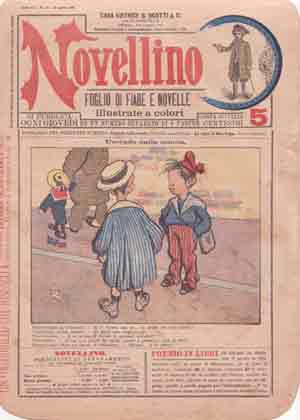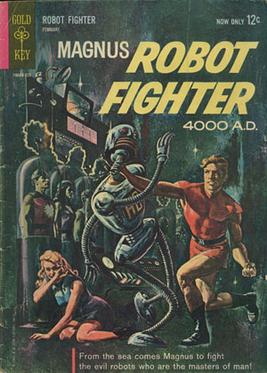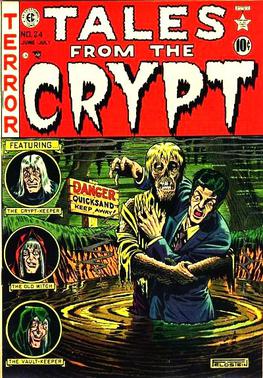
Maxmagnus is an Italian comics series featuring an eponymous character, created in 1968 by Italian comic book creator Max Bunker and comics artist Magnus, for the magazine Eureka . [1]

Maxmagnus is an Italian comics series featuring an eponymous character, created in 1968 by Italian comic book creator Max Bunker and comics artist Magnus, for the magazine Eureka . [1]
Maxmagnus was published in 1968–1970 in the form of 4/6-panels short histories, and the issued in a regular series in the 1980s, with art by Leone Cimpellin.
Magnus, meaning "Great" in Latin, was used as cognomen of Gnaeus Pompeius Magnus in the first century BC. The best-known use of the name during the Roman Empire is for the fourth-century Western Roman Emperor Magnus Maximus. The name gained wider popularity in the Middle Ages among various European peoples and their royal houses, being introduced to them upon being converted to the Latin-speaking Catholic Christianity. This was especially the case with Scandinavian royalty and nobility.

James Shooter is an American writer, editor and publisher for various comic books. He started professionally in the medium at the age of 14, and is known for his successful and controversial run as Marvel Comics' ninth editor-in-chief, and his work as editor in chief of Valiant Comics.

Russell George Manning was an American comic book artist who created the series Magnus, Robot Fighter and illustrated such newspaper comic strips as Tarzan and Star Wars. He was inducted into the Will Eisner Award Hall of Fame in 2006.

The Metal Men are a group of superheroes that appear in DC Comics. The characters first appeared in Showcase #37 and were created by writer Robert Kanigher and artist Ross Andru. Debuting in the Silver Age of Comic Books, the characters have appeared in comic books and other DC Comics-related products such as animated television series, clothing, figurines and trading cards.
Notable events of 1996 in comics.
Max Bunker, pen name of Luciano Massimiliano Secchi, is an Italian comic book writer, and publisher, best known as the co-author of Alan Ford.

Italian comics, also known as fumetto, plural form fumetti, are comics that originate in Italy. The most popular Italian comics have been translated into many languages. The term fumetto refers to the distinctive word balloons that contain the dialogue in comics.

Gold Key Comics was an imprint of American company Western Publishing, created for comic books distributed to newsstands. Also known as Whitman Comics, Gold Key operated from 1962 to 1984.

Magnus, Robot Fighter is a fictional superhero who battles rogue robots in the year 4000, appearing in comic books created by writer/artist Russ Manning in 1963. Magnus first appeared in Magnus Robot Fighter 4000 A.D. #1, published by Gold Key Comics in February 1963. The character was subsequently published by Valiant Comics and Acclaim Comics in the 1990s, and was reintroduced by Dark Horse Comics in August 2010. Some aspects of the concept have varied with each publisher.
Fumetti neri is a subgenre of Italian comics, born in Italy with the creation of the Diabolik character (1962).

Kriminal is an Italian comics series featuring an eponymous fictional character, created in 1964 by Magnus and Max Bunker, the authors of Alan Ford, Maxmagnus and Satanik.

Satanik is an Italian crime comics series created in December 1964 by Max Bunker (writer) and Magnus (artist), also the authors of the popular series Kriminal and Alan Ford.
Bonvi, pen name of Franco Bonvicini was an Italian comic book artist, creator of the comic strips Sturmtruppen and Nick Carter.
Notable events of 1968 in comics.
Notable events of 1979 in comics.

Horror comics are comic books, graphic novels, black-and-white comics magazines, and manga focusing on horror fiction. In the US market, horror comic books reached a peak in the late 1940s through the mid-1950s, when concern over content and the imposition of the self-censorship Comics Code Authority contributed to the demise of many titles and the toning down of others. Black-and-white horror-comics magazines, which did not fall under the Code, flourished from the mid-1960s through the early 1980s from a variety of publishers. Mainstream American color comic books experienced a horror resurgence in the 1970s, following a loosening of the Code. While the genre has had greater and lesser periods of popularity, it occupies a firm niche in comics as of the 2010s.

Western comics is a comics genre usually depicting the American Old West frontier and typically set during the late nineteenth century. The term is generally associated with an American comic books genre published from the late 1940s through the 1950s. Western comics of the period typically featured dramatic scripts about cowboys, gunfighters, lawmen, bounty hunters, outlaws, and Native Americans. Accompanying artwork depicted a rural America populated with such iconic images as guns, cowboy hats, vests, horses, saloons, ranches, and deserts, contemporaneous with the setting.
Magnus, pseudonym of Roberto Raviola, was an Italian comic book artist, recognized as one of the greatest Italian cartoonists.

Eureka was a monthly comic magazine published in Italy from 1967 to 1989.